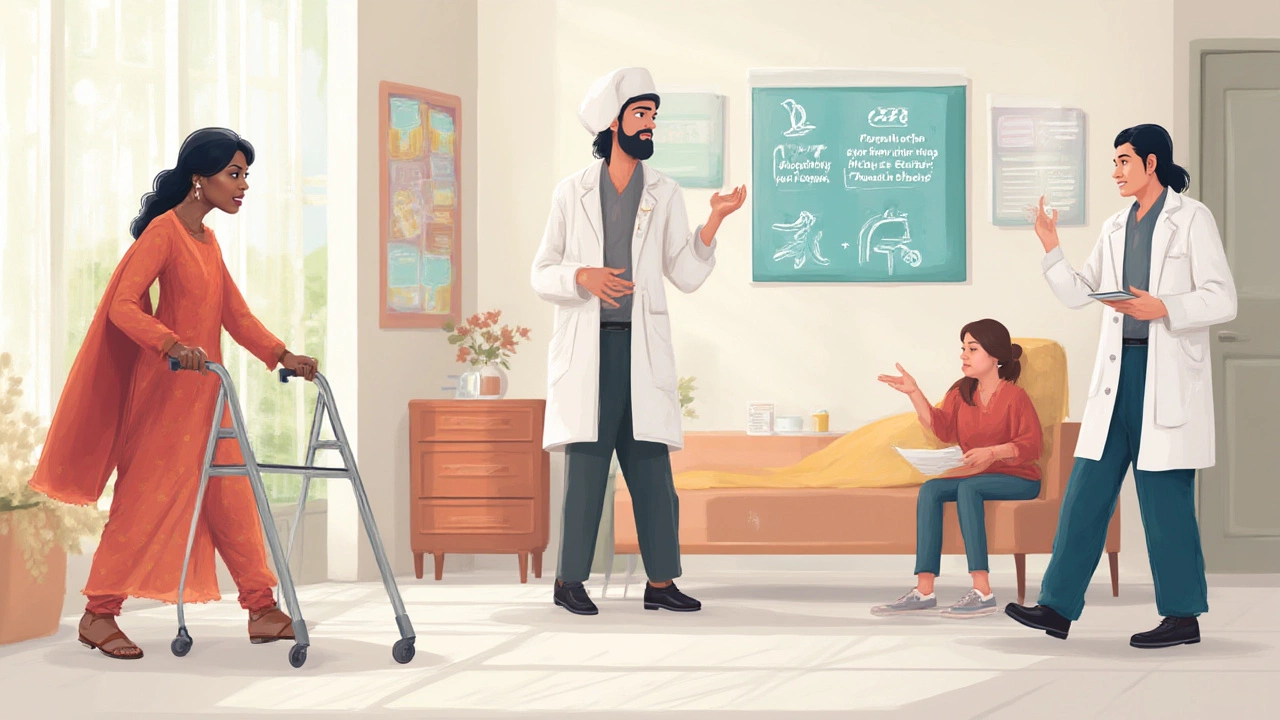Heart surgery has a reputation for being one of those big, scary events in life. Weirdly, people often stress most about the days just after—the hospital stay. Not just how long you’ll be there, but what happens each day, what it means if you stay longer, and what you can do to make those hospital days easier. Turns out, there’s a definite pattern to how long folks stay in hospital after heart surgery. But the reasons behind the numbers will surprise you.
What’s the Real Average Hospital Stay After Heart Surgery?
You may think, "Surely it’s the same for everyone," but nope. There’s actually a wide range, depending on the type of heart surgery, your age, any quirky health issues, and, believe it or not, where you live. According to the American Heart Association, most people who have what doctors call "elective" open heart surgery (think coronary artery bypass) spend about 5 to 7 days in the hospital. But it can swing from as little as three days to closer to ten if there are complications or you're dealing with a more complex procedure.
Here’s a quick breakdown for different types of heart surgeries:
| Type of Surgery | Average Hospital Stay (Days) |
|---|---|
| Coronary Artery Bypass Grafting (CABG) | 5–7 |
| Heart Valve Repair/Replacement | 6–10 |
| Minimally Invasive Heart Surgery | 3–5 |
| Heart Transplant | 14–21 |
If you’re young, otherwise healthy, and had a "less invasive" procedure, you might be home faster than you expect. But if you’re older or have chronic conditions like diabetes, you might stay longer for extra monitoring. Even where you’re getting the surgery plays a role—some hospitals have special post-op recovery units that help you bounce back faster!
The biggest myth? That longer hospital stays mean something went horribly wrong. Often, it’s just extra caution, or it takes a little longer to wake up your intestines (yup, that’s a thing—they slow down after anesthesia). Dr. Sunil Rao, a leading interventional cardiologist, notes,
“Patients do better if we focus on quality of care rather than racing to discharge.”
Why Do Hospital Stays After Heart Surgery Vary So Much?
The length of your stay isn’t just about the surgery itself. It’s about you—from your medical history to your attitude and family support. For example, a 40-year-old non-smoker who exercises regularly might be hopping in and out in four days after a basic valve fix. But someone with heart failure, breathing problems, or who is older might stay a week or more.
Anesthesia and the intensity of surgery matter a lot. Open-heart procedures take their toll, and your body needs time to recover from that stress. Immediately after surgery, doctors keep you in intensive care (ICU) for about 24–48 hours. After that, the focus shifts—getting you out of bed, making sure your heart rhythm is steady, watching for swelling and infection. They won’t send you home until you’re eating, drinking, peeing, pooping, and shuffling up and down the hallway without any drama.
Another wild factor: your surgeon’s protocols. Some hospitals push a “fast-track” recovery, getting people up and moving sooner. This approach can shave days off your stay. Technologies play a role too—minimally invasive tools mean less trauma, less risk, and faster recovery. Location also counts. In the U.S., patients go home earlier compared to the U.K. or Germany, where healthcare policy encourages longer stays for observation.
Here comes a plot twist—social support. If you live alone or don’t have someone to help you heal at home, doctors will keep you longer. Nobody wants to send a heart surgery patient back to an empty apartment. The more support you have, the sooner you’re likely to be discharged.

A Typical Day-by-Day Breakdown of the Hospital Stay
So, what really goes down after you wake up from heart surgery? The first 24 hours are the most dramatic. Tubes everywhere, ICU nurses peeking at monitors every few minutes, and you might drift in and out of sleep. Pain is controlled, but your throat will probably be sore from the breathing tube.
By Day 2, doctors aim to pull out major tubes (like the one in your throat and possibly chest drains). Physical therapists show up, nudging you to swing your legs over the bed and maybe stand up. Sounds crazy, but early movement really works—people who walk sooner recover better, according to a large study from Cleveland Clinic.
If things go as planned, by Day 3 or 4 you’re in a regular hospital room, getting used to eating normal food again, walking (with help at first), and maybe even showering. With each day, nurses will help you practice climbing stairs and doing small self-care tasks. At this point, doctors make sure you can breathe comfortably, your wound is healing, and your heart rhythm is steady.
Many people imagine a hospital stay means long hours in bed—wrong! The golden rule is "move as much as you’re able." If you’re stuck in one spot, that increases the risk of blood clots, weak muscles, and longer boredom.
By Day 5 or so (sometimes earlier), doctors start whispering about discharge. Their checklist? Eat without problems, manage pain with tablet meds, get in and out of bed independently, and walk a few steps. If you tick those boxes—and have help at home—it’s time to pack your bags.
But if there’s an issue, like abnormal heartbeats, lingering weakness, fever, or wound concerns, your stay stretches a bit as doctors play it safe. Trust me, nobody will rush you out the door if they're not sure you’re safe.
Troubleshooting: What Can Delay Leaving the Hospital?
Here’s the stuff nobody likes to talk about, but it’s important. Complications do happen—a 2023 study from Johns Hopkins found that about 1 in 4 patients will have at least one small problem that could keep them in hospital longer than expected.
- Heart rhythm glitches (like atrial fibrillation) that need extra treatment
- Serious wound infections (deep or in the sternum)
- Pneumonia, especially if you have lung conditions
- Fluid build-up around the heart or lungs
- Kidney issues, which sometimes happen after surgery
Most of these are picked up early, since post-surgery wards are practically built for monitoring. Does this mean you failed at recovery? Not at all. Sometimes it’s just bad luck, your body’s immune response, or a side effect of the operation itself.
So what can you do to keep your hospital stay short (and safe)? Get up early, even the day after surgery if allowed. Keep coughing (those heart pillows aren’t for decoration—they help you cough without hurting your chest). Try deep breathing exercises to fight off pneumonia. Ask about leg exercises or wear compression stockings to dodge blood clots.
The real trick is being honest about pain, dizziness, or anything odd—don’t grin and bear it, since hiding stuff can actually keep you stuck in the hospital longer.

Expert Tips for Smoother Heart Surgery Recovery
Friends and family can make or break your first week home. That’s why doctors ask about your support network even before booking the surgery. Plan ahead: set up easy meals, arrange someone to pick you up, and have help with basic chores.
Packing for your hospital stay makes things easier—a comfy robe, slippers with grip, headphones, and a charger for your phone can keep you feeling more like yourself.
Here are some practical tips that heart surgery veterans swear by:
- Move, move, move: Even a quick shuffle to the bathroom helps your body bounce back.
- Don’t fight pain alone: Use pain meds as prescribed—toughing it out leads to shallow breathing, which you want to avoid.
- Eat light at first: Smaller meals are less likely to upset your stomach post-surgery.
- Accept help: You might feel stubborn, but let others do the heavy lifting for a few weeks.
- Watch out for infection: Keep an eye on your incision for redness, drainage, or swelling. Let the nurses know if you see anything strange.
And here’s a secret: the real recovery happens at home. Hospital stays after heart surgery are shorter than ever right now, since home support and telehealth check-ins mean you won’t be left on your own. If anxiety creeps in, ask about counseling or a cardiac rehab program—these can speed up your emotional and physical recovery.
So how long do you stay in hospital after heart surgery? On average, people are ready to go home in less than a week, unless recovery throws you a curveball. But as you’ve seen, every stay is a little different. Being prepared, honest, and willing to move makes all the difference.





